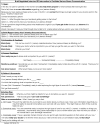Feasibility of a Brief Intervention to Facilitate Advance Care Planning Conversations for Patients with Life-Limiting Illness in the Emergency Department
- PMID: 32471321
- PMCID: PMC7757694
- DOI: 10.1089/jpm.2020.0067
Feasibility of a Brief Intervention to Facilitate Advance Care Planning Conversations for Patients with Life-Limiting Illness in the Emergency Department
Abstract
Background: Advance care planning (ACP) conversations are an important intervention to provide care consistent with patient goals near the end of life. The emergency department (ED) could serve as an important time and location for these conversations. Objectives: To determine the feasibility of an ED-based, brief negotiated interview (BNI) to stimulate ACP conversations among seriously ill older adults. Methods: We conducted a pre/postintervention study in the ED of an urban, tertiary care, academic medical center. From November 2017 to May 2019, we prospectively enrolled adults ≥65 years of age with serious illness. Trained clinicians conducted the intervention. We measured patients' ACP engagement at baseline and follow-up (3 ± 1 weeks) and reviewed electronic medical record documentation of ACP (e.g., medical order for life-sustaining treatment [MOLST]). Results: We enrolled 51 patients (mean age = 71; SD 12), 41% were female, and 51% of patients had metastatic cancer. Median duration of the intervention was 11.8 minutes; few (6%) of the interventions were interrupted. We completed follow-up for 61% of participants. Patients' self-reported ACP engagement increased from 3.0 to 3.7 out of 5 after the intervention (p < 0.01). Electronic documentation of health care proxy forms increased (75%-94%, n = 48) as did MOLST (0%-19%, n = 48) during the six months after the ED visit. Conclusion: A novel, ED-based, BNI intervention to stimulate ACP conversations for seriously ill older adults is feasible and may improve ACP engagement and documentation.
Keywords: advance care planning; behavioral intervention; brief negotiated interview; geriatrics; palliative care; serious illness.
Conflict of interest statement
No competing financial interests exist.
Figures
Similar articles
-
An emergency department nurse led intervention to facilitate serious illness conversations among seriously ill older adults: A feasibility study.Palliat Med. 2023 May;37(5):730-739. doi: 10.1177/02692163221136641. Epub 2022 Nov 15. Palliat Med. 2023. PMID: 36380515 Free PMC article.
-
Fidelity and Feasibility of a Brief Emergency Department Intervention to Empower Adults With Serious Illness to Initiate Advance Care Planning Conversations.J Pain Symptom Manage. 2018 Dec;56(6):878-885. doi: 10.1016/j.jpainsymman.2018.09.003. Epub 2018 Sep 14. J Pain Symptom Manage. 2018. PMID: 30223014 Free PMC article.
-
Emergency department-based, nurse-initiated, serious illness conversation intervention for older adults: a protocol for a randomized controlled trial.Trials. 2022 Oct 9;23(1):866. doi: 10.1186/s13063-022-06797-6. Trials. 2022. PMID: 36210436 Free PMC article.
-
The Feasibility and Effectiveness of Web-Based Advance Care Planning Programs: Scoping Review.J Med Internet Res. 2020 Mar 17;22(3):e15578. doi: 10.2196/15578. J Med Internet Res. 2020. PMID: 32181750 Free PMC article.
-
Interventions Guiding Advance Care Planning Conversations: A Systematic Review.J Am Med Dir Assoc. 2019 Mar;20(3):227-248. doi: 10.1016/j.jamda.2018.09.014. Epub 2018 Nov 22. J Am Med Dir Assoc. 2019. PMID: 30471947
Cited by
-
Physicians' training and patient education initiative to improve quality of care decision communication at the emergency department.BMJ Open Qual. 2024 Sep 26;13(3):e002829. doi: 10.1136/bmjoq-2024-002829. BMJ Open Qual. 2024. PMID: 39327047 Free PMC article.
-
Instruments for Value Elucidation in Older Adults in Clinical Practice-A Scoping Review.J Am Geriatr Soc. 2025 Apr;73(4):1267-1287. doi: 10.1111/jgs.19356. Epub 2025 Jan 10. J Am Geriatr Soc. 2025. PMID: 39792620 Free PMC article.
-
The potential of single session intervention approaches to enhance the mental health and resilience of older adults, care partners, and healthcare systems.Front Public Health. 2025 Mar 5;13:1515440. doi: 10.3389/fpubh.2025.1515440. eCollection 2025. Front Public Health. 2025. PMID: 40109431 Free PMC article.
-
Advance Care Planning Initiatives in Critical Care Centers in Japan: A Case Report.Clin Case Rep. 2025 Jan 7;13(1):e9703. doi: 10.1002/ccr3.9703. eCollection 2025 Jan. Clin Case Rep. 2025. PMID: 39780906 Free PMC article.
-
Aggressiveness of care in the last days of life in the emergency department of a tertiary hospital in Korea.BMC Palliat Care. 2022 Jun 7;21(1):105. doi: 10.1186/s12904-022-00988-3. BMC Palliat Care. 2022. PMID: 35668487 Free PMC article.
References
-
- Bernacki RE, Block SD: Communication about serious illness care goals. JAMA Intern Med 2014;174:1994. - PubMed
-
- Paladino J, Bernacki R, Neville BA, et al. : Evaluating an intervention to improve communication between oncology clinicians and patients with life-limiting cancer: A cluster randomized clinical trial of the Serious Illness Care Program. JAMA Oncol 2019;5:801–809 - PubMed
Publication types
MeSH terms
Grants and funding
LinkOut - more resources
Full Text Sources
Other Literature Sources



